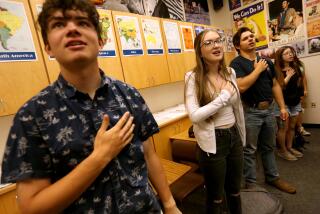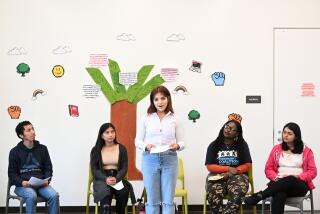Her Drive, Her Death, Her Degree
- Share via
Kimberly Perkins was close to fulfilling her dream of becoming a teacher. She needed just one more semester to get her degree from Cal State Fullerton.
But melanoma and complications that developed from the cancer were too much for her frail body. She died Thursday at the John Wayne Cancer Institute in Santa Monica. She was 23.
Getting the degree was so important to Perkins that her aunt, Joanne Chapman, a teacher herself, took her own degree down from the wall of her home in Fullerton, crossed out her name, penned in Perkins’ and presented it to her in the hospital.
“You earned it,” Chapman told her. “You worked harder than anyone. You deserve this.”
The young woman beamed. She was showing everyone gathered in her room: “Look, I got my degree.”
Her doctor, Lawrence Piro, couldn’t get that image out of his head.
“It kept circling in my mind,” he said. “A young girl who was about to lose her life, whose eyes lighted up and glowed with energy to see her name written on a degree.... The next day I came in and said, ‘I think we should try to get Kimberly a degree of her own.’ ”
He and the family were unable to get it done before Perkins died. But on Friday, Cal State Fullerton President Milton Gordon granted her a posthumous bachelor of science degree in child and adolescent studies.
The young Upland woman never let up in her quest -- not from the time the cancer was diagnosed in July 1999 until the week before Christmas 2002, when she took her final exams in two classes.
“She was always positive,” said her mother, Nancy Perkins. “Even when she had complications or had bad news, she always remained hopeful that her doctors would cure her, positive that she would get to graduate and be a teacher.”
Her life’s path was set. She knew exactly what she wanted. But one of the many moles on her fair skin “went bad,” her mother said. Doctors removed it, but a test of her lymph nodes showed the cancer was still there. A year of interferon treatments seemed to have the disease in check, but in September 2001 it recurred, in her leg.
She underwent at least six operations to remove the tumors spreading through her body. Still she attended classes. After a while she could no longer drive herself to school, so her mother and other family members drove her. By October, she was too weak to walk, so her mother got a wheelchair and wheeled her to her classes.
On New Year’s day, Piro wished Perkins a happy new year. Her response, he said, was, “I made it to 2003.”
“She was lying on a bed with a morphine drip, and she felt victorious,” he said.
“When it became clear that the quest to beat cancer couldn’t be accomplished, we turned our attention to the quest to get her degree,” Piro said.
He and the family petitioned the university system several days before Perkins died, but it took time before her academic record could be checked to see if she had the required number of units to be eligible for a posthumous degree. Then it had to be recommended by the faculty in her department, approved by the dean of the College of Human Development and Community Service, and recommended for approval to the president by the vice president of academic affairs.
With the news that it was approved, her mother and Piro said they plan to make a graduation ceremony of her memorial service, Jan. 12 at Lake Avenue Congregational Church in Pasadena. There, Perkins will receive her own hard-earned degree.
More to Read
Sign up for Essential California
The most important California stories and recommendations in your inbox every morning.
You may occasionally receive promotional content from the Los Angeles Times.













